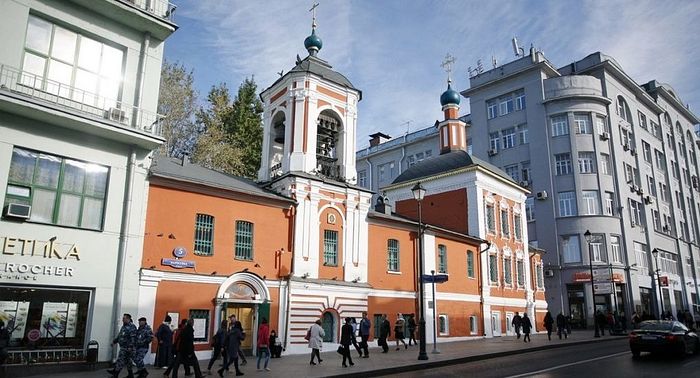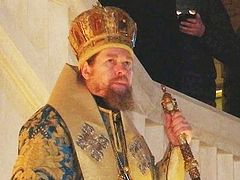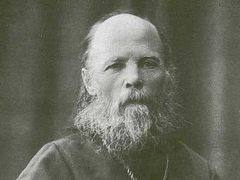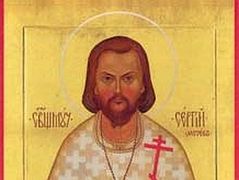Late 19th century Moscow. The ideas of nihilists and revolutionaries stating that people are gods and tsars themselves are becoming increasingly vehement. People in the cities mostly go to Communion only once a year at Easter. In theological schools one can frequently meet people who treat the priesthood as an ordinary trade. For many people, faith had simply become a tradition.
Against this troubling background, you can still hear church bells ring every day. In the small St. Nicholas Church in the Klyonniki District in the center of heavily-populated Moscow, a shortish priest opens the Royal Doors and proclaims, “Blessed is the Kingdom of the Father and the Son and the Holy Spirit, now and ever and unto the ages of ages…” Yet no one comes to the service.
* * *
“Every time I pass by your church, I hear the bells ringing,” an archpriest told him once, “but when I walk in, I see that the church is empty… You won’t achieve anything. You are wasting your time by ringing the bells!” Fr. Alexiy heard these words many times yet continued to perform the services for eight years in a row, without missing a single day.
A hundred years later, this ordinary, modest priest would be canonized and known as Righteous St. Alexiy of Moscow, a miracle worker and seer. In the early twentieth century people came to him in great numbers to ask for advice, and even now miracles happen through the power of his prayers.
Blessed Alyoshenka
The reality of Heaven and God was obvious and clear to many future saints since their young age, and that was why they often seemed different from other people. We know this from various hagiographies, but there are examples of this in twentieth century as well. For instance, John Maximovich, the future Archbishop of Shanghai and San Francisco, was thought to be odd and eccentric. Even when he was a boy, he couldn’t pass by a church without stopping and slowly making the sign of the cross and bowing. Oblivious of people around him, he didn’t feel awkward at all. Once, during his years in a cadet school, the future Archbishop walked out of the marching group of cadets when they were passing by a church during a parade, made the sign of the cross and ran back to the ranks. He was severely reprimanded for this by his superior officers…
Future Father Alexiy Mechev was called “Blessed Alyoshenka” in his childhood [“Alyoshenka” is the affectionate diminutive form of full name Alexiy.—Trans.] His grandfather was an archpriest in Kolomensky uyezd [“uyezd” is an administrative subdivision in the Russian Empire.—Trans.], while his father, Alexiy Ivanovich Mechev, was a choirmaster in the cathedral of Chudov Monastery in the Moscow Kremlin. They taught Alyosha [“Alyosha” is a diminutive form of full name Alexiy. —Trans.] to value and appreciate the Gospel.
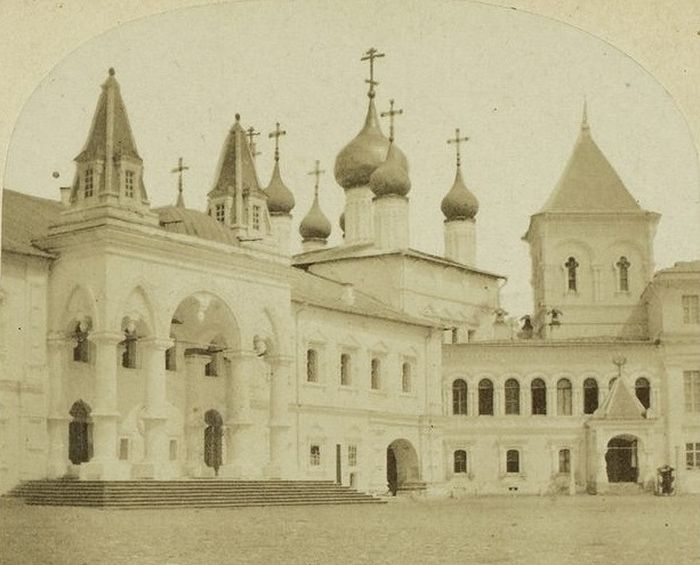 Chudov Monastery, 1959. Source: http://retromap.ru
Chudov Monastery, 1959. Source: http://retromap.ru
“God gave me a simple and child-like faith,” Fr. Alexiy used to say to his godchildren. When he was a child, “Blessed Alyoshenka” could suddenly become very serious in the midst of merriment and games and leave the room to find some seclusion.
He was mild-mannered from an early age. Avoiding quarrels, he always tried to reconcile and cheer everyone up. He was like that all his life and taught that people must live in such a way that being with them would be easy and joyful.
Fr. Alexiy wasn’t simply a kind person who helped some people every now and then. Attentive and selfless, he sympathized with every single person. He just couldn’t have it any other way! “God never rejected anybody, He welcomed everyone and called all people to salvation. He was dying but didn’t forget anybody, He saved the penitent thief and thought about His Mother. So I can’t reject anybody either,” Fr. Alexis used to say.
Even when he reprimanded others, his reproaches were delicate and his tone was kind and gentle, no matter how sinful or lazy the people were and no matter what they did.
“Dear Petyushka! [Petyushka is an affectionate diminutive form of full name Peter.—Trans.]” He wrote in one letter. “It is with great sorrow that I learned that in a time of desperation you stooped to misbehaving, drinking wine and smoking… and succumbed to inebriation. This time I will forgive you and let you go unpunished, provided that you promise not to do that anymore. Dear Petyenka [Petyenka is a diminutive form of full name Peter.—Trans.], don’t worry and your sorrow will turn to joy. Merciful God is with you and all your brothers and sisters are praying for you. Stay well.”
One might think that it was Fr. Alexiy’s letter to his own son! But that was how he treated all people, whether he knew them all his life or met them for just one minute. “The world doesn’t need our discussions, opinions or judgements,” wrote St. Alexiy of Moscow. “It is falling apart because there is not enough love in it.”
“You’re so frail… it is better if you become a priest!”
Alyosha’s parents taught him to be caring, generous, compassionate and sympathetic. He always remembered how his mother invited her widowed sister with three children to stay in the Mechevs’ two-room apartment in Troitsky Lane, even though she had three children of her own—Alyosha, his brother Tikhon and sister Varya. Six children and three adults lived in this apartment, and there was enough room and food for everyone!
Since his youth, Alexiy’s compassionate heart urged him to find a profession that would allow him to work for the benefit of others, so at first he wanted to become a physician. However, his mother, Alexandra Dmitrievna, used to say, “You’re so frail, you can’t be a physician, it is better if you become a priest!” She accurately foresaw her son’s true calling.
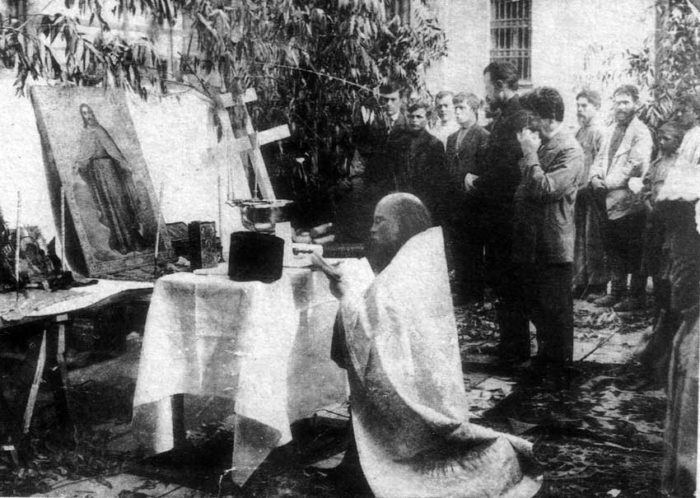 Fr. Alexiy Mechyov during a prayer service
Fr. Alexiy Mechyov during a prayer service
After graduating from the Moscow Theological School, he made his first steps toward achieving this goal. In 1880, he became a psalm reader in Znamenskaya Church that was located in Znamenka Street [Psalm reader is the lowest clerical rank. Psalm readers read texts and prayers from the Holy Scripture during the church services. Alexiy wasn’t ordained yet.—Auth.].
Here his amiability and kindness were put to a serious test. Father George, the quick-tempered and irritable priest of the church, started picking on the 21-year-old psalm reader, for some reason demanding that he work as a watchman. He always found fault with Alexiy and sometimes even hit him. Tikhon, Alexiy’s younger brother, often saw Alexiy in tears. Asking for a transfer to another church would have seemed logical, but Alexiy tolerated everything without any complaints. He didn’t become embittered and didn’t stop caring about people.
Years later, at the funeral of his cruel superior, Fr. Alexiy was crying too, but these were the tears of gratitude, for he realized that inadvertently the priest taught him a useful lesson and helped him overcome his weaknesses, including selfishness that Fr. Alexiy considered to be the worst human flaw…
My beautiful wife…
It is often convenient to depict saints as legendary heroes devoid of ordinary human feelings and emotions. But this is not so. Hagiographies rarely contain details about sentiments of the saints, but in case of Elder Alexiy, we can learn about his emotions and feelings from the extant correspondence with his wife and children.
“My beautiful… precious wife Nyushenka [Nyushenka is an affectionate diminutive form of full name Anna.—Trans.]… love of my life, take your medicine and drink more milk”; “Forget about everything and think only of getting better soon, find consolation in the thought that your husband is constantly thinking of you… Even though I’m 25 versts [verst is a Russian measure of length, about 0.66 mile.—Trans.] away from you, my precious wife, I feel like I know what you think of and what you do;” “My sunshine”…
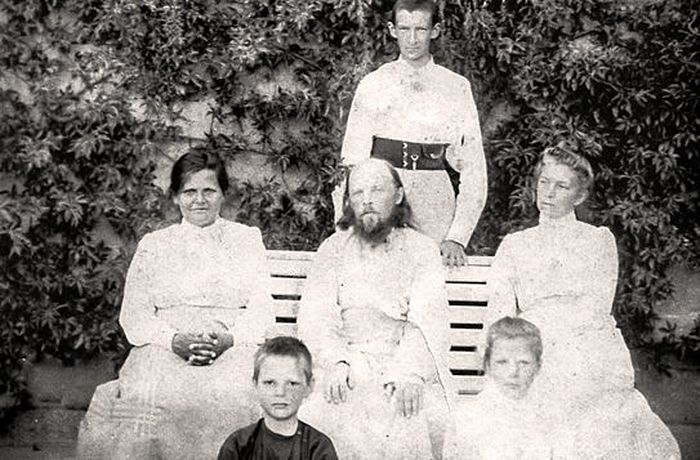 Fr. Alexiy Mechyov with his family. Anna Petrovna, Fr. Alexiy’s wife, is to the left of him.
Fr. Alexiy Mechyov with his family. Anna Petrovna, Fr. Alexiy’s wife, is to the left of him.
That was how the future saint addressed his wife, Anna Petrovna Molchanova. She also came from a clerical family. They had such a charmingly endearing relationship!
They had five children. Alexandra was born in their fourth year of marriage in 1888. Then they had Anna in 1890. Alexiy was born in 1891 and died when he was under a year. Sergey, the future martyr priest, was born in 1892, and Olga was born in 1896. Even years after their wedding, Fr. Alexiy wrote touching and heartfelt letters to his wife.
“My darling, you left your bracelet and rings on my table, but don’t you worry about them—I found them and will bring your jewelry over on Sunday. I kiss you many times. Your Lyonechka.”[1]
Anna Petrovna wasn’t exceptionally beautiful, but she had a kind and lively disposition (it is clearly visible on her photographs at any age) and a strong and simple faith. Fr. Alexiy, a priest, an ascetic and a future glorified saint, wrote to her humbly, “I know that you are a deeply believing person; please pray for me, my angel, so that I could be as believing as you are.”
On March 19, 1893, Fr. Alexiy became the priest of St. Nicholas the Wonderworker church in Klyonniki District. He was ordained into priesthood by Bishop Nestor, the head of Novospassky Monastery in Moscow. The ordination took place in Zaikonospassky Monastery that can still be found few steps away from the Kremlin. The parish was very small and poor, and Fr. Alexiy became its only priest. Matushka [the title of a priest’s wife.—Trans.] Anna shared her husband’s selfless service.
God knows the depths of every person’s heart, so He sent a companion like her to the saint, and she played an important role in Fr. Alexiy’s life.
He always remembered his wife as a friend who softly guided him and drew his attention to the things that he overlooked. “I was very happy,” he wrote to his son years after her death, “when your late mother noticed something I did wrong and told me about it. I would immediately take her comments to heart and adjust my actions accordingly… I don’t want to be static. Since we don’t notice our own flaws, we can improve only with the help of people who are close and dear to us…”
Their lives were darkened only by the fact that Matushka Anna suffered from severe cardiac insufficiency, and with years the disease was progressing. She married when she was 18, and by 36 she was suffering greatly from edema: her body swelled, she felt weak and it was difficult for her to breathe. It was so hard for her that at one point she asked her husband to stop praying for her to stay alive…
Anna Petrovna passed away on August 29, 1902. According to the old-style church calendar, it is the commemoration day of the Beheading of St. John the Forerunner—a repentant, sorrowful day when strict fasting is prescribed…
Meeting the Righteous John of Kronshtadt
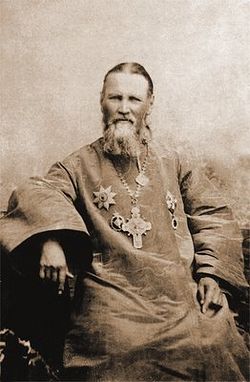 Righteous John of Kronshtadt. Photo, early 20th century. Father Alexiy took the death of his wife very hard. He would lock himself up in his room, praying to God and crying. Later in his letters, he admitted that he was very “attached” to his beloved wife and suffered from loneliness and his widowerhood…
Righteous John of Kronshtadt. Photo, early 20th century. Father Alexiy took the death of his wife very hard. He would lock himself up in his room, praying to God and crying. Later in his letters, he admitted that he was very “attached” to his beloved wife and suffered from loneliness and his widowerhood…
There were many widowers among the priests at that time, but few of them attained sainthood. The death of his dearly beloved wife marked an important milestone for Fr. Alexiy. He stepped over the line between human love and Divine Love, denying himself for the sake of others and developing the ability to understand the true nature of people. Yet he never took any credit for this gift.
All this is a mystery of a man’s internal transformation. We only know certain milestones on his way.
Once Fr. John (Sergiyev), a famous Kronstadt preacher and miracle-worker who would be later canonized, heard from his acquaintances about the hardships of Fr. Alexiy and came to visit the inconsolable priest.
“Did you come to share my sorrow?” Fr. Alexiy asked the Kronstadt priest when he walked in. Fr. John answered, “I came to share your joy, not sorrow.
“God is visiting you. Get out of your cell and talk to people; only after you do that will you start living. You dwell upon your sorrows and think that nobody is more grief-stricken than you are… Go be with people, see other peoples’ sorrows and empathize with them. Then you will see that your sorrow is insignificant in comparison, and you will feel better.”
After that, the priests performed a service together in one of the Moscow churches.
This marked the beginning of Fr. Alexiy’s special journey, the journey of the elder. It was special because he, who was always considerate of others, now denied himself to devote his life to serving people.
“The priest must belong to people”
This is not to say that Fr. Alexiy was out of touch with people before meeting Fr. John of Kronshtadt. Helping the needy any time he could, Fr. Alexiy set up a shelter for orphans and underprivileged children. He was one of the few Moscow priests who performed Liturgy every day. He did it for eight years in a row, almost totally alone!
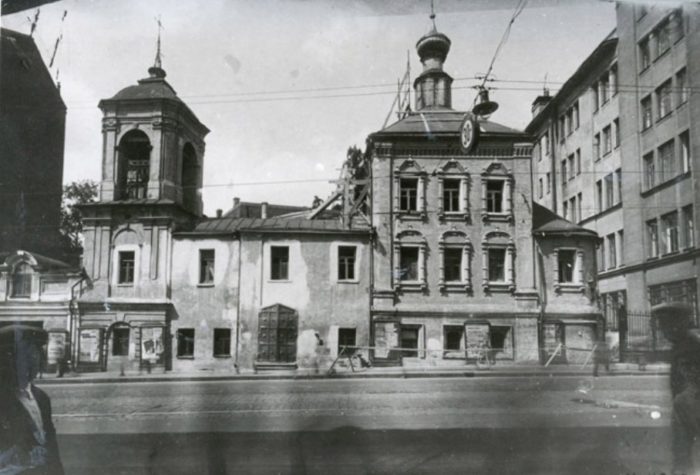 St. Nicholas Church in Klyonniki District, 1920-1930. Source: http://retromap.ru
St. Nicholas Church in Klyonniki District, 1920-1930. Source: http://retromap.ru
People started coming to Klyonniki District, because they knew that they could always come to confession or simply talk to the priest. The doors of his church were always open. With time, he got a reputation in Moscow as a priest you could talk to and get consolation or advice in the most difficult times.
Fr. Alexiy used to say, “A priest must belong to the people.” In his letters to his relatives, he mentioned that he talked to people till late night and went to bed at 2 am, only to wake up early in the morning to be ready for the next day.
“It is easy to say, ‘I love everybody’,” he wrote, “but loving everybody is a lifelong commitment that requires a lot of experience.”
Build up your willpower!
As a very well-organized and composed person, Fr. Alexiy attributed great significance to self-discipline and willpower, always telling his godchildren to establish order in their lives and build up their willpower.
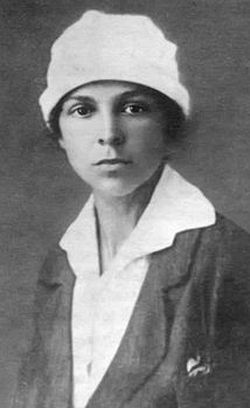 Maria Nikolayevna Sokolova,1918. According to Maria Nikolayevna Sokolova, his goddaughter and a famous icon painter who later became a nun with the name Juliania, Fr. Alexiy “always encouraged his congregation’s spiritual accomplishments,” saying that “even a small accomplishment is necessary as it helps build up willpower.”
Maria Nikolayevna Sokolova,1918. According to Maria Nikolayevna Sokolova, his goddaughter and a famous icon painter who later became a nun with the name Juliania, Fr. Alexiy “always encouraged his congregation’s spiritual accomplishments,” saying that “even a small accomplishment is necessary as it helps build up willpower.”
When people asked him how to solve their problems and improve their life, he told them to keep on praying. “Pray fervently and relentlessly,” he wrote in one of his letters.
He admitted that he used to lack willpower himself and emphasized the importance of overcoming this flaw:
“Dear K.P., God has shown us such great mercy, and yet, sinful and lazy, we do not want to take a moment of our lives to thank Him. So instead of praying, which is of the utmost importance, we go about our everyday hassles and chores, forgetting about God and our duty!”
“I said it only so that the others would hear it, silly!”
People were drawn to Fr. Alexiy because it was obvious that God bestowed upon him the gift of clairvoyance. Thoroughly concealing this gift, Fr. Alexiy often told his visitors stories about other people in similar circumstances. However, sooner or later they realized what he was talking about…
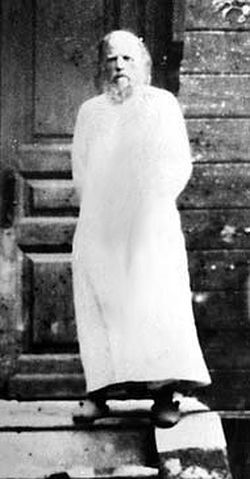 Once a woman came to Fr. Alexiy with a difficult question: Her husband went missing during World War I, and now, nine years later, a good man asked for her hand in marriage. Should she marry him, or should she still wait for her husband? Fr. Alexiy in his usual way told her a story: “This is what can happen. Once a woman came to me and said, “Father, please give me your blessing to marry again, my husband was a prisoner of war for many years, he’s probably dead now.” I didn’t bless her to do it, but she didn’t heed my advice and got married. Eight or nine days after her marriage ceremony, her husband returned from prison. Now she has two husbands and must decide whose wife she is!” Nonplussed, the woman decided to postpone the marriage. A few days later, her husband suddenly returned!
Once a woman came to Fr. Alexiy with a difficult question: Her husband went missing during World War I, and now, nine years later, a good man asked for her hand in marriage. Should she marry him, or should she still wait for her husband? Fr. Alexiy in his usual way told her a story: “This is what can happen. Once a woman came to me and said, “Father, please give me your blessing to marry again, my husband was a prisoner of war for many years, he’s probably dead now.” I didn’t bless her to do it, but she didn’t heed my advice and got married. Eight or nine days after her marriage ceremony, her husband returned from prison. Now she has two husbands and must decide whose wife she is!” Nonplussed, the woman decided to postpone the marriage. A few days later, her husband suddenly returned!
Once a woman from Tula came to Fr. Alexiy. Her only son was missing. She came to the Church of St. Nicolas the Wonderworker and stood in line to venerate the cross. When Fr. Alexiy saw her, he pointed the cross over the heads of the people who stood before her and said, “Pray for him like you pray for living people!” Later, when he met her, he said gently to the distressed woman, “You’re a happy mother. A happy mother. What are you crying about? I am telling you – he is alive!” And then he told her a story that supposedly happened. “A woman visited me a few days ago. She was worried about her son; meanwhile he was fine, working at a tobacco factory in Sofia.” A few months later, the woman received a letter from her son where he wrote that he was working at a tobacco factory in Sofia.
On another occasion, two girls Fr. Alexiy never saw before came to him to ask for his blessing to become nuns. He blessed one of the girls right away and told the second girl that she should go home. She was very upset, but when people talked to her, they found out that she lived with her elderly mother who was sick and didn’t want her daughter to join the convent.
There were also funny, yet always edifiying situations. Olga Seraphimovna, the headmistress of an orphanage, came to the liturgy with her employee and worried inwardly that the priest might say something about her that would make her look bad in the eyes of her employee. So she urged her employee to go in front of herself to venerate the cross. When Fr. Alexiy saw Olga Seraphimovna, he raised the cross and, blessing her, said loudly, “Olga, you are so wise!” When she came closer to him, he leaned and whispered in her ear, “I said it only so that the others would hear it, silly.” And then he looked at her with his usual kind smile. That was how he taught people around him not to think too much of themselves, as he never put on airs, always saying, “What about me? I’m not worthy…”
After the Revolution
The situation in Russia was deteriorating as the revolution of 1917 was impending. Russian people wanted to be with God, but for many of them church life had turned into an onerous tradition that they felt couldn’t bring forth anything positive, while the changes offered by the revolution seemed so auspicious, fair, fresh and alluring. These changes, however, eventually brought on the bloody nightmare of hatred and fratricide. Fr. Alexiy wrote about the split in society and the resulting indifference of people: “Not only every social group, but even every family lived by themselves, without seeking the good of everybody, caring only about their personal benefit…”
In 1919, it the midst of the Civil War, when the future was bleak and unpredictable, Fr. Alexiy’s son Sergey was ordained into the priesthood. He proved to be an amazingly resolute, strong and courageous man, and his faith was as passionate as his father’s…
Fr. Alexiy lived the last years of his life in the most difficult period of Russian history, when according to his contemporaries, “in winter, Moscow looked like a decrepit village. The streets and sidewalks weren’t cleaned. The sidecars stopped running. People walked in the middle of the street, carrying sacks behind their backs in hope of finding something to eat.” But Fr. Alexiy continued to perform daily services. The number of parishioners at his church on Maroseyka Street grew and he started collecting donations to help the needy, the elderly, and large families. Twice he was summoned to the Joint State Political Department [the national security organization of the USSR.—Trans.], where he was told to stay away from the believers. But the elder continued doing what he did, gathering people around himself.
Like John the Apostle, the only one of Christ’s apostles who didn’t die a martyr’s death, elder Alexiy avoided prisons and exiles and died a natural death in 1923. He simply lay down on his bed and passed away quietly…
His son, priest Sergiy Mechyov, was arrested in 1929. Left without priests, the church on Maroseyka Street was shut down in the 1930s…
Serious trials lay in store for the spiritual children and relatives of Fr. Alexiy. What would the elder have said to them? Would he say that life was unfair and difficult? Would he say that some were in favor, while others were unjustly persecuted and lived in squalor and poverty? No, again and again, he would have told them about love. “Remember, the unfairness of this world is an opportunity for us to show our love for each other and take care of those who are in dire straits,” Fr. Alexiy used to teach. “An opportunity to do a good deed for somebody is God’s mercy for us, and so we must always strive to help others! After every good deed, you feel joyful and tranquil… you have nothing to fear, for nobody can do any harm to you.” And nobody could do any harm to Fr. Alexiy, a man whose love for people was boundless.
You must love God with all your heart!
Many people of Moscow came to bid farewell to Fr. Alexiy. Members of various parishes led by their priests kept coming to the church on Maroseyka Street. In accordance with Fr. Alexiy’s will, the funeral service was performed by Archbishop Theodor (Pozdeyevsky), the abbot of Danilov Monastery, who was miraculously released from prison shortly before the event. Fr. Alexiy was buried at the St. Lazarus Cemetery. Many people came to his grave to pay their respects. Ten years later, the cemetery was closed, and the remains of Fr. Alexiy and his wife were transferred to the “Vvedenskie (Entrance) Hills” Cemetery (also known as the German Cemetery). Elder Alexiy’s relics turned out to be uncorrupt…
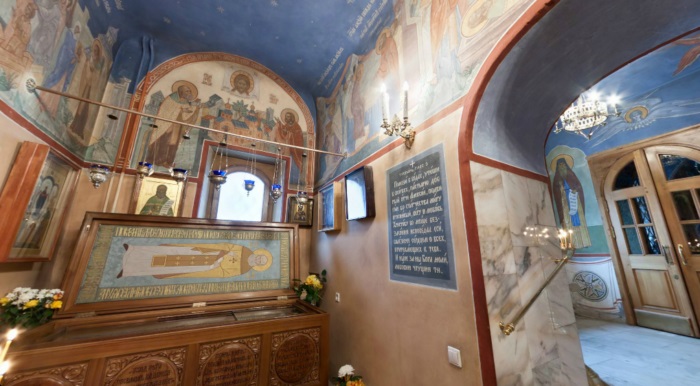 The relics of the Righteous Alexiy of Moscow, St. Nicholas Church in Klyonniki District. Source: http://www.klenniki.ru
The relics of the Righteous Alexiy of Moscow, St. Nicholas Church in Klyonniki District. Source: http://www.klenniki.ru
Fr. Alexiy and his son, hieromartyr Sergiy Mechev, who was executed by firing squad in 1942, were canonized in 2000. The elder’s relics are kept in the St. Nicholas Church in Klyonniki District, Moscow, in the church where he served for 30 years.
Fr. Alexiy’s simple, difficult and remarkably beautiful life is an amazing example that shows us that achieving sainthood is always a choice made by a resolute person. Fr. Alexiy could have performed various religious rites requested by parishioners, celebrated services on holidays and Sundays and led the usual quiet life of a priest, the way many priests of that time did. He could have been simply a kind priest who after a while would be forgotten by future generations. But… People keep coming to venerate his relics to this day. And the church where he served still maintains the amazing atmosphere of a true Christian community, despite years of persecution.
The saints are among us. They will be with us till the end of time. Following Christ’s teachings, the saints—whether they lived ages ago or in the tumultuous twentieth century—keep on calling to us: “Love, love with all your heart!”

